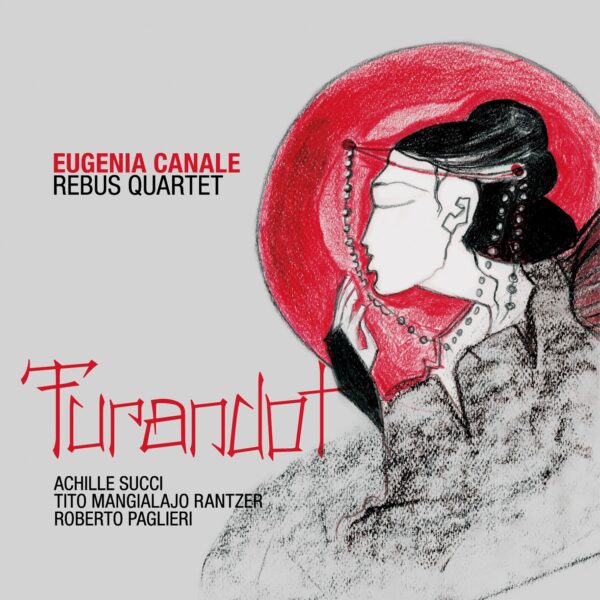Eugenia Canale Rebus Quartet – Turandot (Abeat Records, 2025)
C’è un momento, durante l’ascolto di Turandot, in cui il tempo si ferma. Lo fa nel cuore di un’aria conosciutissima, forse in una cadenza ritmica inaspettata, o nel timbro caldo di un clarinetto basso che pare evocare più l’ombra di un ricordo che la presenza di una melodia. È lì che capisci che questo non è solo un progetto jazz, ma un’esperienza. Un sogno. Un rebus, appunto.
Eugenia Canale prende l’ultima e incompiuta opera di Puccini e la immerge nelle acque profonde e rifrangenti del linguaggio jazz. Lo fa da pianista, da arrangiatrice, da visionaria. Con lei, il Rebus Quartet – Achille Succi al sax alto e al clarinetto basso, Tito Mangialajo Rantzer al contrabbasso e Roberto Paglieri alla batteria – compie un atto di trasformazione che è insieme poetico e analitico, colto e istintivo.
Non è la prima volta che il jazz italiano si confronta con l’opera lirica, ma Turandot è qualcosa di diverso. È un lavoro organico, coerente, radicale. Non un’aria decontestualizzata qua e là, ma un viaggio attraverso la narrazione pucciniana, seguendone l’arco drammaturgico, reinventandolo da cima a fondo.
Il jazz qui è chiave di lettura, filtro onirico, dispositivo narrativo. Il quartetto non si limita ad accompagnare il tema: lo interroga, lo scompone, lo veste di nuovi colori ritmici, lo riscrive come se fosse materia vivente.
“Popolo di Pekino!” spalanca il sipario con una tensione percussiva che scardina la solennità dell’originale. È un’ouverture teatrale e densa, dove la ritmica incalza e il sax di Succi tesse un velo di mistero, sospeso tra oriente e astrazione.
In “Gira la cote!”, la ripetizione meccanica del gesto artigiano si trasforma in loop ritmico quasi tribale. Il piano incalza con timbri duri, mentre la batteria modella un groove che strizza l’occhio a certo jazz elettrico. È un brano ipnotico, nervoso, che imprime energia e inquietudine.
“Nuda perla ch’altera / Là sui monti dell’est” è forse la traccia più visionaria del disco. Si apre come un corpo in movimento, attraversato da timbri liquidi e da un senso di continua trasformazione. Eugenia Canale ha contribuito alla scrittura, e il suo pianismo regala alla musica un tocco vivo e concreto, spingendo il quartetto in territori liberi e quasi astratti.
Il sax alto di Succi diventa voce e respiro nella struggente “Non piangere, Liù!”, una delle vette emotive del disco. Qui tutto si raccoglie: i silenzi, le pause, il respiro trattenuto. Il pianoforte intesse piccole figure melodiche che sembrano sciogliersi nel tempo. La sezione ritmica accompagna con pudore, lasciando alla melodia tutto lo spazio necessario per commuovere., una delle vette emotive del disco.
“Olà, Pang! Olà, Pong!” ci riporta in scena con energia grottesca. È un brano che gioca sulla teatralità del contrasto: il tempo accelera, i registri cambiano, gli strumenti si rincorrono. C’è un’ironia di fondo, ma anche una sapiente costruzione a spirale che attraversa diverse tensioni emotive.
“Gravi, enormi ed imponenti” suona come una marcia scomposta, oscillante tra solennità e derisione. La melodia si frammenta e si ricompone tra richiami orchestrali e accenti hard bop, con la batteria di Paglieri che detta un passo incalzante ma irregolare.
Poi c’è “Straniero ascolta / Rebus”, che è anche un autoritratto concettuale del gruppo. Canale intreccia l’idea di enigma a un intreccio musicale complesso e stratificato, come se tra le note si nascondesse una domanda in attesa di risposta. Qui le geometrie diventano mobili, i ruoli si scambiano e la struttura si piega su sé stessa.
“Nessun dorma!” viene citato con pudore: il celebre tema è solo accennato, scomposto e lasciato fluttuare su armonie destabilizzanti. È un momento lirico e trattenuto, quasi un’eco lontana. Il contrabbasso di Rantzer lavora in sottrazione, mentre il pianoforte ricama una linea fragile e commossa.
Infine, “Tu che di gel sei cinta” chiude il disco con un’atmosfera intima, notturna. Il pianoforte torna protagonista e racconta, più che suonare: un addio che è anche una sospensione, come il finale incompiuto che Puccini ci ha lasciato.
Il nome del gruppo, Rebus Quartet, non è solo un vezzo: è una dichiarazione d’intenti. Come nella corte di Turandot, anche qui si gioca con gli enigmi. Canale ne nasconde davvero qualcuno tra le tracce e le note, ma il vero mistero è quello che si percepisce nella musica stessa, nel modo in cui l’opera si rifrange in mille specchi, rivelando la sua modernità sfuggente.
C’è una qualità quasi cinematografica nell’approccio della pianista: non è un caso che la scrittura pucciniana – con la sua carica emotiva, la sua ricerca timbrica, la sua tensione verso il nuovo – anticipasse le tecniche e le atmosfere della colonna sonora del Novecento. Canale lo capisce bene, e la sua lettura è insieme narrativa e astratta, come se raccontasse la trama con gli occhi chiusi, per immagini interiori.
Va detto, infine, che Turandot non è un disco facile. Ma è un disco necessario. Perché mostra come il jazz possa ancora raccontare, trasformare, osare. Perché restituisce Puccini al presente. Perché afferma tutta la qualità e personalità di Eugenia Canale, una delle protagoniste più interessanti della scena jazzistica contemporanea.
E perché, proprio come l’opera da cui nasce, anche questo Turandot sa parlarci d’amore, di mistero, di metamorfosi. In un linguaggio che non ha bisogno di parole, ma solo di ascolto attento e cuore aperto.
Un plauso convinto anche ad Abeat Records che continua a credere nella qualità e nell’audacia progettuale del nuovo jazz italiano.
Track list:
Popolo di Pekino
Gira la cote!
Nuda perla ch’altera / Là sui monti dell’est
Non piangere, Liù!
Olà, Pang! Olà, Pong!
Gravi, enormi ed imponenti
Straniero Ascolta / Rebus
Nessun dorma!
Tu che di gel sei cinta
Carlo Cantini
ingegnere di registrazione, ingegnere del missaggio, ingegnere del mastering
Elisabetta Bozzi
artwork della copertina
Marina Barbensi
grafica
Irene Della Casa
fotografia
English version
Eugenia Canale Rebus Quartet – Turandot (Abeat Records, 2025)
There is a moment, during the listening of Turandot, when time stops. It happens in the heart of a very well-known aria, perhaps in an unexpected rhythmic cadence, or in the warm timbre of a bass clarinet that seems to evoke more the shadow of a memory than the presence of a melody. It is there that you understand this is not just a jazz project, but an experience. A dream. A rebus, indeed.
Eugenia Canale takes Puccini’s last and unfinished opera and immerses it in the deep and refracted waters of the jazz language. She does this as a pianist, arranger, visionary. With her, the Rebus Quartet – Achille Succi on alto sax and bass clarinet, Tito Mangialajo Rantzer on double bass, and Roberto Paglieri on drums – performs an act of transformation that is at once poetic and analytical, cultured and instinctive.
It is not the first time Italian jazz has confronted opera, but Turandot is something different. It is an organic, coherent, radical work. Not a few decontextualized arias here and there, but a journey through Puccini’s narrative, following its dramaturgical arc and reinventing it from top to bottom.
Jazz here is a key to understanding, a dreamlike filter, a narrative device. The quartet does not merely accompany the theme: it interrogates it, breaks it down, dresses it in new rhythmic colors, rewrites it as if it were living material.
“Popolo di Pekino!” throws open the curtain with a percussive tension that breaks the solemnity of the original. It is a theatrical, dense overture where the rhythm urges forward and Succi’s sax weaves a veil of mystery suspended between the East and abstraction.
In “Gira la cote!”, the mechanical repetition of the artisan’s gesture transforms into an almost tribal rhythmic loop. The piano pushes forward with harsh timbres, while the drums shape a groove that winks at electric jazz. It is a hypnotic, nervous piece, imparting energy and unease.
“Nuda perla ch’altera / Là sui monti dell’est” is perhaps the most visionary track on the album. It opens like a moving body, traversed by liquid timbres and a sense of continuous transformation. Eugenia Canale contributed to the writing, and her pianism gives the music a lively and concrete touch, pushing the quartet into free and almost abstract territories.
Succi’s alto sax becomes voice and breath in the poignant “Non piangere, Liù!”, one of the album’s emotional peaks. Here everything gathers: the silences, the pauses, the held breath. The piano weaves small melodic figures that seem to dissolve in time. The rhythm section accompanies discreetly, leaving the melody all the space it needs to move the listener.
“Olà, Pang! Olà, Pong!” brings us back on stage with grotesque energy. It’s a piece playing on the theatricality of contrast: the tempo accelerates, registers shift, instruments chase each other. There is an underlying irony but also a skillful spiral construction crossing various emotional tensions.
“Gravi, enormi ed imponenti” sounds like a disjointed march, oscillating between solemnity and derision. The melody fragments and recomposes among orchestral calls and hard bop accents, with Paglieri’s drums dictating a driving but irregular pace.
Then there is “Straniero ascolta / Rebus,” which is also a conceptual self-portrait of the group. Canale intertwines the idea of an enigma with a complex and layered musical weave, as if a question waiting for an answer hid among the notes. Here geometries become mobile, roles switch, and the structure folds onto itself.
“Nessun dorma!” is quoted with restraint: the famous theme is only hinted at, broken down and left floating over destabilizing harmonies. It is a lyrical and contained moment, almost a distant echo. Rantzer’s double bass works subtractively, while the piano embroiders a fragile and heartfelt line.
Finally, “Tu che di gel sei cinta” closes the album with an intimate, nocturnal atmosphere. The piano returns as protagonist and tells more than it plays: a farewell that is also a suspension, like the unfinished finale Puccini left us.
The group’s name, Rebus Quartet, is not just a flourish: it is a statement of intent. Like in Turandot’s court, enigmas are played with here too. Canale really hides some among the tracks and notes, but the true mystery is what you perceive in the music itself, in the way the opera is refracted in a thousand mirrors, revealing its elusive modernity.
There is an almost cinematic quality in the pianist’s approach: it is no coincidence that Puccini’s writing – with its emotional charge, its timbral search, its tension toward the new – anticipated the techniques and atmospheres of the 20th century film score. Canale understands this well, and her reading is both narrative and abstract, as if telling the plot with closed eyes, through inner images.
It must be said, finally, that Turandot is not an easy album. But it is a necessary one. Because it shows how jazz can still tell stories, transform, dare. Because it returns Puccini to the present. Because it affirms all the quality and personality of Eugenia Canale, one of the most interesting protagonists of the contemporary jazz scene.
And because, just like the opera it stems from, this Turandot speaks to us of love, mystery, metamorphosis. In a language that needs no words, only attentive listening and an open heart.
A sincere applause also goes to Abeat Records, which continues to believe in the quality and boldness of the new Italian jazz scene.
Track list:
Popolo di Pekino
Gira la cote!
Nuda perla ch’altera / Là sui monti dell’est
Non piangere, Liù!
Olà, Pang! Olà, Pong!
Gravi, enormi ed imponenti
Straniero Ascolta / Rebus
Nessun dorma!
Tu che di gel sei cinta
Carlo Cantini
recording engineer, mixing engineer, mastering engineer
Elisabetta Bozzi
cover artwork
Marina Barbensi
graphic design
Irene Della Casa
photography


